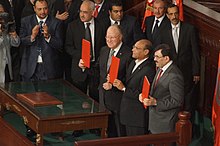Constitution of the Republic of Tunisia
| Basic data | |
|---|---|
| Title: | Constitution of the Republic of Tunisia |
| Type: | Constitution |
| Scope: | Tunisia |
| Legal matter: | Constitutional law |
| Original version from: | |
| Entry into force on: | |
| Last revision from: | 2014 |
| Entry into force of the new version on: |
January 27, 2014 |
| Please note the note on the applicable legal version. | |
The Constitution of the Republic of Tunisia ( Arabic دستور الجمهورية التونسية, DMG dustūr al-ǧumhūriyya at-tūnisiyya ) has been in force since January 27, 2014, replacing the transitional constitution in force since December 11, 2011. After the upheavals during the Tunisian Revolution , the country's old constitution was suspended. This old constitution was promulgated by Habib Bourguiba on June 1, 1959 , after the former French colony of Tunisia declared its independence from France . It consisted of 78 articles and has been changed several times over the years, sometimes significantly. After the first free elections in Tunisia in October 2011, a constituent assembly was commissioned to draft a new Tunisian constitution, which was passed on January 26, 2014 (approval of 200 of the 216 MPs).
The 2014 constitution, like that of 1959, provides for the form of government as a republic, with Islam as the religion and Arabic as the language. She describes Tunisia as a bourgeois state that is based on popular sovereignty and the rule of law , guarantees freedom of conscience and equality. For the first time in the Arab world, the constitution also stipulates that as many women as men should sit in the elected chambers. It is unclear whether the commitment to Islam in Article 1 has any legal effects. Islamic law ( Sharia ) was deliberately not provided for in the constitution as a legal source or basis for legislation. From 1959 to 2011, Tunisia was governed secularly and Islamist groups persecuted, despite the wording of the constitution . According to Article 74, the state president must be of a Muslim denomination; 98% of citizens meet this requirement.
Text output
- Arabic : text of the 2014 Constitution ; French-language edition: Constitution. In: Majles.Marsad.tn .
- German : Constitution of the Republic of Tunisia. Tunis, January 26, 2014. Translation by the language service of the German Bundestag. In: KAS.de .
- French : Texts actualisé de la constitution de 1959 (Jurisite Tunisie) - old constitution between 1959 and 2011
- French : Texts original de la constitution de 1959 (Université de Perpignan) - original version of the old constitution from 1959
Web links
- Key Aspects of Tunisia's New Constitution. In: AhramOnline , January 26, 2014.
- Rainer Wandler: role model for the whole region. In: the daily newspaper , January 27, 2014.
- Zaid al-Ali, Donia Ben Romdhane: Tunisia's New Constitution: Progress and Challenges to Come. In: OpenDemocracy.net , February 16, 2014.
- Achim-Rüdiger Börner: The new constitution of the Republic of Tunisia - an introduction. PDF. In: Society for Arabic and Islamic Law , February 2014.
- Hardy Ostry: New constitution for Tunisia comes into force. Unique and compromise at the same time. In: Konrad-Adenauer-Stiftung : Country Report Tunisia , February 11, 2014.
- Chawki Gaddes: The political order of Tunisia according to the constitution of 2014. In: Heinrich Böll Foundation : Dossier: Tunisia elects! October 21, 2014.
Individual evidence
- ↑ a b c Political change: Tunisians cheer for new constitution. In: Spiegel Online . January 27, 2014, accessed January 27, 2014 .
- ↑ Transitional constitution adopted in Tunisia. In: RP Online . December 11, 2011, accessed January 20, 2012 .

